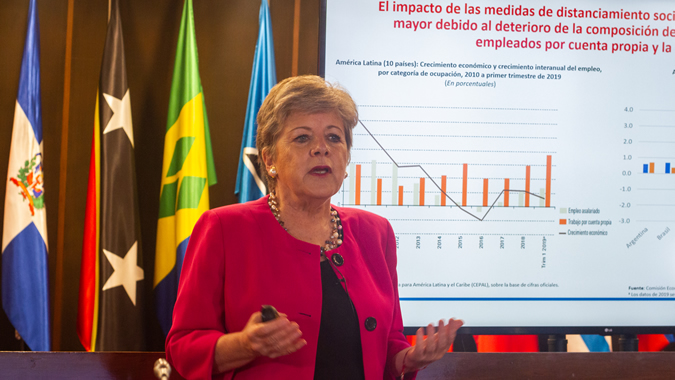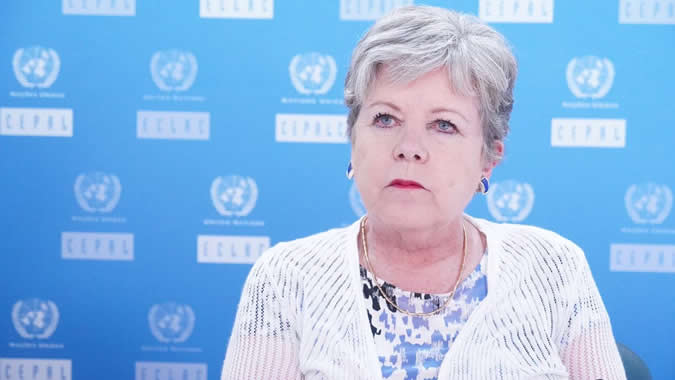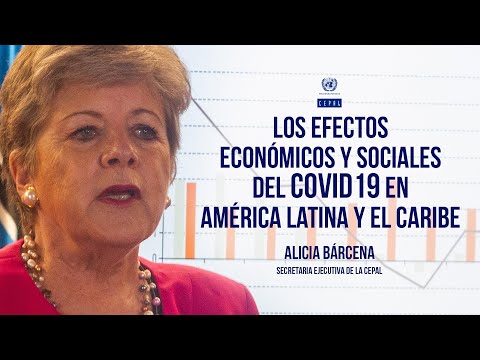The Only Strategic Option in the Medium Term to Mitigate COVID-19’s Effects in the Region is to Move Towards a New Development Model through Greater Integration
Work area(s)
A new report by ECLAC warns that the crisis unleashed by the coronavirus illness could lead to a contraction of at least -1.8% in Latin America and the Caribbean’s GDP in 2020.

The United Nations Economic Commission for Latin America and the Caribbean (ECLAC) affirmed that the region has no other strategic option but to move towards a more sustainable development model through greater integration in order to mitigate the effects of the COVID-19 pandemic in the region, in a new document released today at its central headquarters in Santiago, Chile.
The report entitled Latin America and the Caribbean and the COVID-19 pandemic: Economic and social effects was unveiled at a virtual press conference (via video) by the organization’s Executive Secretary, Alicia Bárcena. The report addresses this critical juncture, scenarios and projections ahead of 2030 in light of the current global pandemic crisis, while also recommending policy actions in diverse areas to counteract its negative consequences.
ECLAC’s study indicates that only with a new development model will the region be able to avoid retreading the paths that led to a situation in which the effects of the COVID-19 pandemic may not just be devastating in the short term, but may also damage the conditions for recovery and development further along.
The report stresses the urgency of implementing immediate measures in the region that allow for flattening the curve of contagion by the coronavirus (COVID-19) illness, without flattening the curve of the economy.
Furthermore, it calls on governments in the region to take urgent action to address the sanitary emergency, the social emergency and the economic emergency. In the long term, it also implores countries to rethink their development strategies, strengthening subregional and regional coordination and integration to ensure supply chains of critical goods, to promote voluntary – not forced – migration, to alleviate poverty and foster a reduction in inequality, and to bolster intraregional trade and production chains, among other measures.
“The world finds itself facing a humanitarian and health crisis without precedent in the last century, in an economic context that was already adverse. In contrast to 2008, this is not a financial crisis but rather one affecting people, production and well-being. A war economy situation is too important to be left to the market. States are taking a central role to suppress the virus and the risks that will affect the economy and social cohesion,” Alicia Bárcena stated.
ECLAC’s Executive Secretary added that in this scenario, international cooperation plays a critical role. “Emerging from this crisis will depend on the economic strength of each country; therefore, given the asymmetries between developed and developing countries, the role of the UN, the IMF and the World Bank will be essential for guaranteeing access to financing and sustaining social spending and economic activity with innovative measures,” she indicated.
She specified that, to support the follow-up and monitoring of progress in the medium and long term, ECLAC has set in motion a COVID-19 Observatory – an effort coordinated by ECLAC with the support of United Nations resident coordinators that will present updated information on each country’s policy announcements and other material of interest. The Observatory contains information about movements within and between countries, health, work, economics and schooling.
The study indicates that Latin America and the Caribbean confronts the pandemic from a weaker position than the rest of the world. Before the arrival of COVID-19, ECLAC had foreseen that the region would grow a maximum of 1.3% in 2020. However, the effects of this crisis have prompted it to change this estimate and forecast a decline of at least -1.8% in GDP, although a contraction of between -3% and -4%, or even more, cannot be ruled out. The final economic impact will depend on the measures taken at a national, regional and global level, the Commission warns.
According to the report, the COVID-19 crisis will have direct economic effects on health systems and mortality rates, and indirect effects that will materialize in the economy’s supply and demand dynamics.
One of the direct effects involves the impact on health systems in the region, which have infrastructure that is insufficient for managing the problems generated by the pandemic. The majority of the region’s countries are characterized by having weak and fragmented health systems that do not guarantee the universal access needed to confront the COVID-19 sanitary crisis. For that reason, strengthening health systems requires more and better public spending: on average, the region’s countries spend 2.2% of GDP on health; therefore, it is necessary to find fiscal space to strengthen these systems.
The indirect effects of the crisis unleased by the pandemic are being felt in the region through six external transmission channels: 1) The decline in economic activity among its main trading partners and its effects; 2) The fall in commodities prices; 3) The interruption of global value chains; 4) The lower demand for tourism services; 5) The decline in remittances; and 6) The intensification of risk aversion and the worsening of global financial conditions.
According to ECLAC’s study, it is forecast that the value of the region’s exports will fall by at least 10.7% in 2020, due to the decline in prices and to a contraction in global aggregate demand. In addition, given that the propagation of the virus has accelerated the use of Internet and digital technologies, this increase can exacerbate inequalities stemming from uneven access to them between countries and between income groups.
Regional integration is crucial for confronting the crisis, the United Nations organization stresses. The region’s countries have production capacities that are unsophisticated and fragmented at a regional level, which means that it is necessary to scale up national and regional capacities, mainly in the production and provision of essential goods. To that end, it is imperative that intraregional trade be furthered, the report indicates.
In the domestic realm, the containment measures will have costs in terms of production (up to 67% of regional GDP) and employment (up to 64% of formal employment). Likewise, measures for prevention and containment will deepen the crisis of care in the region: in the period prior to this sanitary crisis, women spent between 22 and 42 hours a week on activities involving domestic and care work. Pressure on health systems will have a significant impact on women, since they account for 72.8% of all people employed in this sector.
“The world and the region face a recession that will have effects in the short and long term. The question is how to minimize their costs and resume growth. The magnitude will depend, among other factors, on the forcefulness of the economic response, where fiscal policy plays a critical role,” Alicia Bárcena emphasized.
According to ECLAC, to address the sanitary emergency, it is imperative that the containment measures suggested by the World Health Organization (WHO) be applied immediately and efficiently, that health systems be strengthened, and that universal access to tests, medication and cures be ensured. To address the social emergency, officials must take measures to protect the income of the most vulnerable groups, measures to protect employment (such as unemployment subsidies and a basic emergency income supplement), and measures to support Small and Medium-sized Enterprises (SMEs) and self-employed workers.
Meanwhile, to address the economic emergency, the study explains that actions involving fiscal policy, monetary policy and international cooperation are needed. On fiscal matters, budgets must be reorganized to implement fiscal stimulus packages with the aim of strengthening health systems, protecting income, and minimizing the economic contraction. In the monetary realm, officials must seek to stabilize exchange rates and preserve the solvency and proper functioning of the banking market. And to incentivize international cooperation, it is necessary to reconsider international bodies’ policies on concessional loans and on graduation mechanisms that disqualify countries from receiving aid. In addition, low-interest loans should be made available and debt servicing by developing countries, including middle-income ones, should be deferred.
In particular, the United Nations organization calls for lifting the sanctions imposed on Cuba and Venezuela to enable their access to food, medical supplies and COVID-19 tests, and medical assistance. “It is time for solidarity, not exclusion,” the document indicates.
In the long term, the region must rethink its development strategies to prevent the severity of future shocks, the report emphasizes. In this sense, ECLAC proposes the creation of a regional fund dedicated to the particular needs of middle-income countries to support the social, economic and production-related recovery. Furthermore, it stresses the importance of having flexible support from multilateral financing organizations. Developing countries must collectively negotiate loans and debt servicing under favorable conditions and review the policies for “graduating” middle-income countries, it explains.
“ECLAC offers an intergovernmental space for convening interested parties from the public and private sectors, civil society and academia to develop political solutions to the long-term impacts of this crisis and to monitor their effects,” Alicia Bárcena stated.
The report also warns that the COVID-19 crisis endangers the integrality of the 2030 Agenda for Sustainable Development and its Goals (SDGs). As part of its analysis, it presents simulation exercises for 72 statistical series of the SDG indicators. According to the Commission, 73% of the indicators analyzed show that problems exist for achieving the SDGs by the year 2030. In this sense, ECLAC emphasizes that it is crucial to evaluate the impact of the policies utilized to implement the 2030 Agenda in the region’s countries. Therefore, to support the follow-up and monitoring of progress in the medium and long term, the organization has developed two specific instruments: the SDG Gateway and the COVID-19 Observatory, which will be made available to the community soon.
Related content
Current conditions, scenarios and projections to 2030 amid the COVID-19 crisis
Presentation by Alicia Bárcena, ECLAC Executive Secretary.
Zero Hour: Our Region in the Face of the Pandemic
Op-ed by Alicia Bárcena, ECLAC Executive Secretary.

COVID-19 Will Have Grave Effects on the Global Economy and Will Impact the Countries of Latin America and the Caribbean
ECLAC’s Executive Secretary, Alicia Bárcena, warned that the region’s economies will suffer the pandemic’s negative consequences via numerous channels.

Related link(s)
Country(ies)
- Latin America and the Caribbean
Contact
Public Information Unit
- prensa@cepal.org
- (56 2) 2210 2040